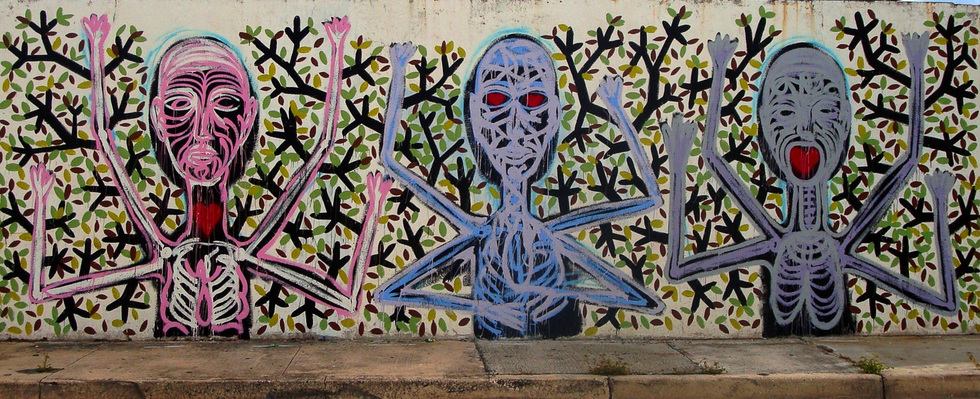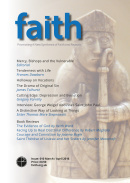Depression and Evolution
Gregory Farrelly FAITH MAGAZINE Msrch - April 2016
Depression and Evolution
Blessed John Henry Newman was so influenced by the emerging theory of human evolution by Darwin that he used the metaphysics of an evolutionary principle in his Essay on the Development of Christian Doctrine (1845), offering a profound insight into the organic development in the doctrine and life of the church. There is a dearth of orthodox modern theology that contains a similar metaphysical principle of evolution. The Faith movement, of course, does offer such a theology.
About a quarter of the population will experience some kind of mental health problem in the course of a year, with mixed anxiety and depression the most common mental disorder in Britain. In the early stages of human evolution, biochemical ‘inflammatory’ responses developed to give an evolutionary advantage in coping with ‘attack’ from microbes, etc. In an interesting, though dense, article in Nature Reviews Immunology, (The role of in inflammation in depression: from evolutionary imperative to modern treatment target, Andrew H. Miller & Charles L. Raison, Nature Reviews Immunology, 16, 22–34 (2016), doi:10.1038/nri.2015.5, published online: 29 December 2015: https://www.nature. com/nri/journal/v16/n1/full/nri.2015.5.html) which I have attempted to summarise, the authors detail how inflammatory responses can account for some of the stresses associated with depression and other anxiety disorders. The human biochemical response to pathogens is linked with avoidance and alarm response mechanisms in the face of predators and other perceived dangers or stress. The release of inflammatory chemicals called ‘cytokines’ (proteins secreted by specific cells involved in immunity and in inflammation) leads to biochemical reactions involving neurotransmitters. This shows itself at a higher level in disordered human behaviours, implying psychological illness. ‘...Interactions between in inflammation and the brain appear to drive the development of depression and may contribute to non-responsiveness to current antidepressant therapies...[The] inevitability of our evolutionary past is apparent in the high rates of depression that are seen in society today.’ (ibid).
An evolutionary adaptive mechanism
When volunteer subjects were chosen to give a speech to a panel of ‘behavioural experts’ – a ‘stressor’ – they experienced ‘ fight or flight’ responses characterised by increases in heart rate and blood pressure. The stressor also activates key inflammatory pathways in peripheral blood cells and increases in levels of pro-inflammatory cytokines. Patients with depression exhibit the main features of an inflammatory response, including increased expression of cytokines and their receptors. Administration of inflammatory cytokines to otherwise non-depressed individuals causes symptoms of depression, whereas the blocking of cytokines has been shown to reduce depressive symptoms. Interestingly, exposure to pro-inflammatory cytokines produces a sickness syndrome with symptoms that overlap with those seen in depression and that respond to treatment with antidepressants. Also, symptoms associated with infections are often mistaken with those occurring at the onset of depression. Inflammation has also been associated with antidepressant non-responsiveness. In a recent study, 45% of patients with non- response to conventional antidepressants exhibited a high CRP (C-reactive protein: CRP is produced by the liver. A high concentration of CRP indicates in ammation). A higher percentage of patients with depression and treatment resistance, childhood maltreatment, medical illnesses and metabolic syndrome have high CRP. Indeed, I can vouch for this personally. During a long stay in hospital I had very high CRP levels and also became depressed and anxious.
Immune response
‘In essence, the body mounts an immune response not against a pathogen, but against a threat to the subject’s self-esteem’ (ibid.). This is further indicated by the fact that those at high risk of developing depression show increased inflammatory responses to such laboratory stressors. The greater the inflammatory response to a psychosocial stressor, the more probable the subject is to develop depression over the ensuing months.
The question arises as to why a stimulus involving no biological pathogen should induce an inflammatory response, and why this response should promote the development of depression. The authors state that there is no coherent answer if immunity is viewed as merely another physiological system within the body but, when considered against the background of millions of years of co-evolution between mammals and microorganisms, the ‘inflammatory bias’, reflected in the association between immune activation and depression, makes sense as an evolutionary adaptive mechanism and also provides insight into another question concerning ‘alleles’. Some genes have a variety of different forms, which are located at the same position on a chromosome; an allele is such a variant form of a gene. Until recently, half of the human race died from infectious causes before adulthood, providing strong selective pressure for genetic alleles that enhance host defence but why are the genetic alleles that are most frequently associated with depression so common in the modern gene pool?
Evolutionary legacy of an inflammatory bias
The link between depression and the immune system has been shown using positron emission tomography using a tracer for the translocator protein (TSPO) showing increased immune activation in the brains of patients with major depressive disorder compared with control subjects. Peripheral inflammatory responses may, then, serve as biomarkers and thus serve as targets of immune-based therapies for depression.
Evolution occurs at the microscopic level by changes in genes as a result of the survival of the most adapted organisms for the environment in which they live. Since such organisms preferentially survive, the ‘survival of the fittest’, the genetic structure of these groups is the one inherited. The article notes that “the association of childhood trauma with increased in ammation is linked to stress-induced epigenetic changes in FKBP5, a gene implicated in the development of depression and anxiety’ (ibid).
Nearly a third of all patients with depression fail to respond to conventional antidepressant therapies but there is considerable hope for the treatment of such illnesses. An improved understanding of the inflammatory response biochemical mechanisms in patients with depression may lead to the development of new anti- depressants, although anti-inflammatory therapies are unlikely to be all-purpose antidepressants. The importance of inflammatory biomarkers such as CRP as predictors of symptoms may be the most positive development in the quest to understand how the immune system might be harnessed to improve the treatment of depression.
This article uses the mechanism of biological evolution to develop a theory of depression/anxiety disorders. The Faith philosophy uses a metaphysics that draws on the scientific theory of evolution to elucidate the relationship between created matter and spirit. In this vision, ‘matter’ is inherently related to ‘mind’, the power that controls and directs ‘matter’. Towards the peak of evolution, just before the first human being, nature itself required the creation of an individual ‘mind’ with its own, non-material, ‘spiritual’ control, a quite startling and beautiful philosophical and theological statement. Thus the first human being, a living person, uniting spiritual and material natures as body and soul, came into being, a being intrinsically related to other humans materially and spiritually and intrinsically in relationship with the supreme, perfect principle of its own spiritual being, God.
Gregory Farrelly has a PhD in Nuclear Structure Physics and an MTh in Modern Systematic Theology and is a member of the Institute of Physics.


